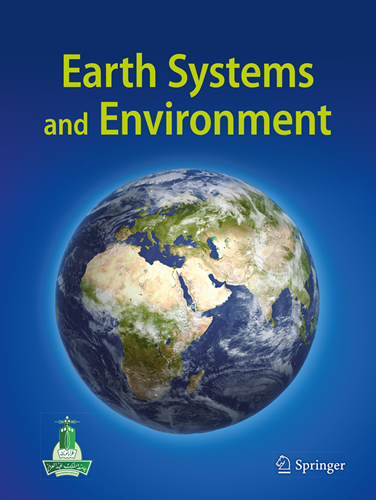Use of Spatial Variability of Soil Quality Index Models and Soil Properties for Soil Quality Evaluation in the Irrigated Perimeter, Semi-Arid Region of Morocco
IF 5.3
Q1 ENVIRONMENTAL SCIENCES
引用次数: 0
利用土壤质量指数模型和土壤性质的空间变异性评价摩洛哥半干旱区灌溉周界土壤质量
本文章由计算机程序翻译,如有差异,请以英文原文为准。
求助全文
约1分钟内获得全文
求助全文
来源期刊

Earth Systems and Environment
Multiple-
CiteScore
15.50
自引率
5.60%
发文量
50
期刊介绍:
Earth Systems and Environment(ESEV) publishes peer-reviewed original and review articles on the entire range of Earth systems and environment in order to further our understanding of the natural workings and various processes and interactions that govern the Earth systems in response to complex environmental problems caused by natural and human-induced forcings.
The journal disseminates high-quality information on cutting-edge developments in the various research fields of Earth systems and environment based on new methods, theories, and applications. It has a multidisciplinary character, focusing on interrelated scientific topics combining diverse aspects of the Earth systems and environment including:
Climate and atmospheric sciences; Earth and environment related agricultural sciences; natural hazards and engineering; marine sciences; ecology; desertification; pollution; geo-environmental hazards; droughts and floods; hydrosphere, lithosphere and troposphere dynamics; waste management; numerical models of earth systems; geographical information systems; remote sensing; and environmental health, etc.
In order to meaningfully explore these topics, researchers in the environmental Earth science disciplines are invited to contribute their original research and review articles on significant scientific advances in the form of papers, technical notes, broad reports, case studies, reviews, brief communications and discussions.
More about the journal:
Published by Springer in partnership with King Abdulaziz University (KAU).
Indexed in Web of Science ESCI and Scopus (2021 Cite Score = 6.5).
Authors of the best papers receive an award and a remuneration from KAU each year.
Papers are screening for originality and similarities before handling them by topical editors.
The journal uses double-blind review.
The first round of peer review does not exceed 30-45 days.
Mostly two/three or even four revisions are required before final acceptance.
Committed to meeting standards of ethical behavior at all stages of the publication process.
The COPE code of conduct and Springer editorial policies are used as the basis for the publication process.
Earth Systems & Environment (ESEV) is committed to upholding the integrity of the scientific record. As a member of the Committee on Publication Ethics (COPE) the journal will follow the COPE guidelines on how to deal with potential acts of misconduct. Authors should refrain from misrepresenting research results which could damage the trust in the journal and ultimately the entire scientific endeavor. Maintaining integrity of the research and its presentation can be achieved by following the rules of good scientific practice as detailed here:
https://www.springer.com/us/editorial-policies
 求助内容:
求助内容: 应助结果提醒方式:
应助结果提醒方式:


